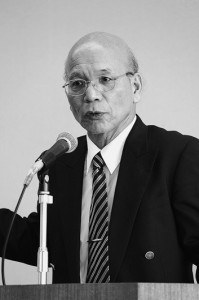Tenri University’s Oyasato Institute for the Study of Religion is currently presenting a public lecture series entitled “Modern Society and Tenrikyo.” The second lecture in the series was delivered on May 25 by Prof. Yoshinori Sawai, researcher at the institute. Below is a translation of the summary of his lecture published in the Tenri Jiho newspaper:
In modern society, there is a growing tendency to think that all is well if the present is well for oneself alone. Meanwhile, Tenrikyo’s momentum seems to have been waning for some time in a manner that has led some to raise concerns. In the Divine Directions, we read: “Jiba is a mirror, just as the world is a mirror. As the world reflects the states of mind of the world’s people, so does Jiba reflect all its cloudiness. . . . The world is clouded by the principle of human reasoning” (Osashizu, February 1, 1897). This seems to suggest that those of us who have been taught the path need to increase our efforts to genuinely live in a way that embodies the path, not in a way that obscures the path (Osashizu, October 13, 1887), so that the path-based way of living can be increasingly reflected in modern society, which is a mirror.
Tenrikyo’s view of the world includes the teaching that “this universe is the body of God.” Also, its Story of Creation says that when humans “grew to eight inches (8 sun), the bottom of the muddy ocean began to develop highs and lows by the providence of God the Parent” (The Doctrine of Tenrikyo, chap. 3). Thus, Tenrikyo’s view of the world seems to include an ontological relationship whereby the natural world develops in line with human development. Based on the above statements, the ill conditions appearing in the world, including what is happening to the Earth’s environment, may be seen as reflecting or “mirroring” the states of mind of us humans.
As to Tenrikyo’s view of human beings, the teaching that expresses it most succinctly is that of “a thing lent, a thing borrowed.” According to this teaching, humans are enabled to be alive and provided for by the complete and perfect providence of God, the Parent of humanity.
It may be noted that the Ofudesaki contains a number of references to God’s impatience with the actual human condition. For example, we find phrases such as “there is no one who knows the origin” (III:92) and “You talk only about things already visible” (III:115).
It goes without saying that this condition is due to the freedom of mind with which humans are provided by God—a freedom that is indicated by the teaching that “the mind alone is yours” (Kakisage).
Fortunately, when the need arises we are alerted to our state of mind through challenging situations such as illness. If we address the situation facing us by making a sustained effort to sweep away the dust of the mind—which is its cause—we are able to replace the mind.
From this, it seems to follow that whether or not society will improve and whether or not the Tenrikyo community will grow will depend largely on how we follow the “path of single-heartedness with God.”
What, then, should our life of faith be like? The answer is that our life should be focused on working to realize the “Joyous Life,” which is the purpose for which God created humankind and which is, therefore, the ultimate goal of human existence.
Here, one thing we need to be careful about is that “true joy” flows from helping others be spirited, such joy leading also to our own spiritedness, as clearly indicated by this Divine Direction:
There is God-guided joy and self-serving joy. You cannot follow through with self-serving joy even if you try to. Only when your joy brings joy to others, can it be called true joy. If you enjoy yourselves while causing others to suffer, this cannot be called true joy.
Osashizu, December 11, 1897
Another thing worth noting is indicated in the Ofudesaki verse that tells us: “Take delight in the main path that lies ahead” (III:37). The verse encourages us to maintain hope in the face of any situation, however difficult.
Life gives us many challenges, which are often impossibly difficult for us to deal with by ourselves. Particularly at such times, the implementation of mutual help is indispensable. It will also bring supreme joy to God the Parent.
Regarding the present state of the Tenrikyo community, Director-in-Chief of Administrative Affairs Yoshitaro Ueda remarked last November, “Our community still has a great deal more potential than you might imagine.”
All of us Yoboku need to accept his remark sincerely and redouble our efforts to make sure that a way of living that is based on the teachings is reflected more widely in society.
If the path becomes spirited, society will also become spirited. In addition, if we each give full play to our “potential,” it will undoubtedly increase vibrancy in the Tenrikyo community as well.




